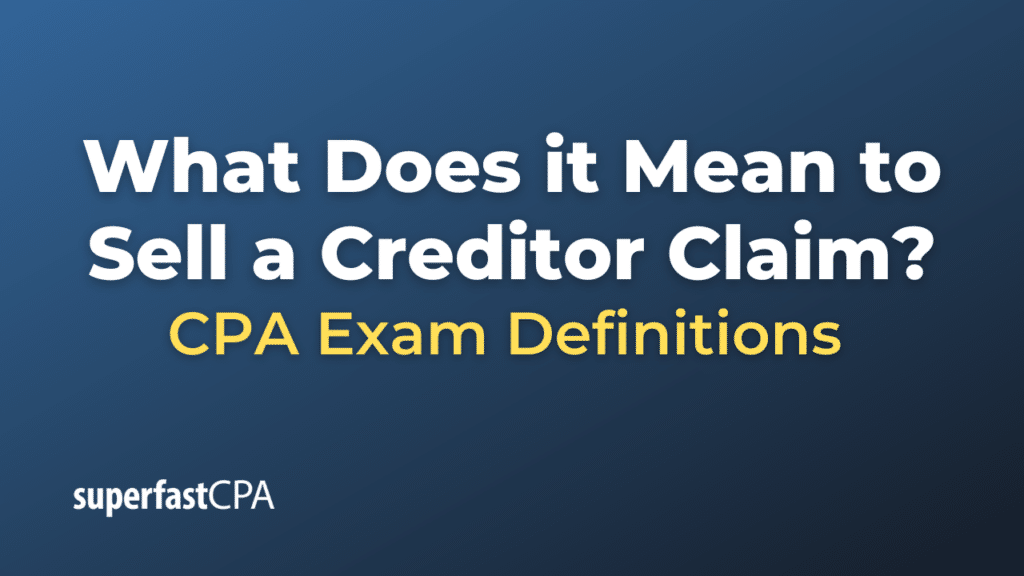Sell a Creditor Claim
Selling a creditor claim means that a creditor transfers or sells its right to collect a debt owed to it by a debtor to another party. This often happens for a fraction of the face value of the claim. The party that buys the claim then has the right to collect the full amount of the debt from the debtor or may further negotiate or settle for a reduced amount.
There are various reasons why a creditor might decide to sell a claim:
- Immediate Cash Needs: If a creditor needs immediate cash and doesn’t want to wait for a debtor to repay the debt over an extended period, selling the claim can provide immediate liquidity.
- Risk Management: If a creditor believes that the debtor might default or that collecting the debt will be challenging or costly, the creditor might sell the claim to mitigate the risk of loss.
- Reduction of Overhead: Chasing after delinquent accounts can be resource-intensive. By selling problematic debts, a company can reduce the overhead related to collections.
- Bankruptcy Proceedings: In bankruptcy situations, creditors might sell their claims to specialized investment firms or “vulture investors.” These firms often buy claims at a discount, hoping to profit by either receiving a larger payout from the bankruptcy proceedings or by leveraging the claims to acquire assets or equity in the restructuring process.
- Bundle and Sell: Some financial institutions might bundle multiple debts (like credit card debts) and sell them as a package to third-party collection agencies.
It’s worth noting that the sale of a creditor claim typically involves a legal transfer of rights. The new party, often called a debt buyer, becomes the legal owner of the debt and has the legal authority to pursue collections, negotiate settlements, or take other actions as the original creditor might have.
For debtors, the sale of a creditor claim can change their point of contact for the debt. They would need to direct payments or communications to the new debt owner rather than the original creditor. It’s also possible that the new debt owner might employ different collection strategies or be more amenable to negotiations than the original creditor.
Example of Sell a Creditor Claim
Max purchased a high-end home theater system from XYZ Electronics Store on credit. He promised to pay back the $5,000 owed in 12 monthly installments. However, after only three payments, Max lost his job and stopped making payments on his debt. Five months have passed, and Max hasn’t resumed his payments, leaving an outstanding debt of $3,750.
Sale of Creditor Claim:
- XYZ’s Dilemma: XYZ Electronics Store has sent multiple reminders to Max and even tried to work out a new payment plan, but with no success. XYZ is a small business, and while $3,750 might not be a vast sum for some larger corporations, it’s significant for them. They don’t have a dedicated collections department and don’t want to spend more resources trying to recover the debt.
- Debt Buying Company: ABC Debt Buyers, a company specializing in buying delinquent debts, approaches XYZ Electronics Store with an offer. They propose buying Max’s debt of $3,750 for $1,500. ABC Debt Buyers has a more extensive infrastructure, resources, and expertise to handle and recover delinquent debts.
- XYZ’s Decision: After considering the offer, XYZ Electronics Store decides to sell Max’s debt to ABC Debt Buyers for $1,500. In doing so, XYZ gets immediate liquidity and can move on from the delinquent account, even if it means taking a loss.
- After the Sale: ABC Debt Buyers now owns the debt. They contact Max and start their process of recovering the outstanding amount. Due to their expertise and resources, ABC Debt Buyers might offer Max a settlement (e.g., “Pay $2,500 now to settle the full amount”), or they might set up a new payment plan, or use other legal means to recover the debt. Any money collected by ABC Debt Buyers above the $1,500 they paid for the debt will be their profit.
This example showcases the process and reasoning behind selling a creditor claim. While XYZ Electronics Store did not recover the full amount owed, they mitigated their losses and freed up resources by selling the debt. ABC Debt Buyers, on the other hand, took on the risk of collecting the debt but also the potential to profit from their specialized expertise in debt recovery.













